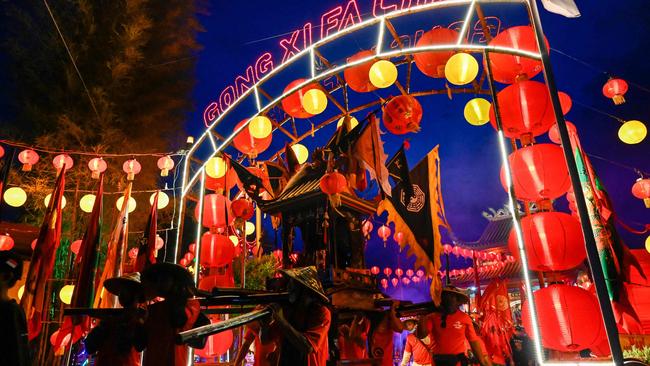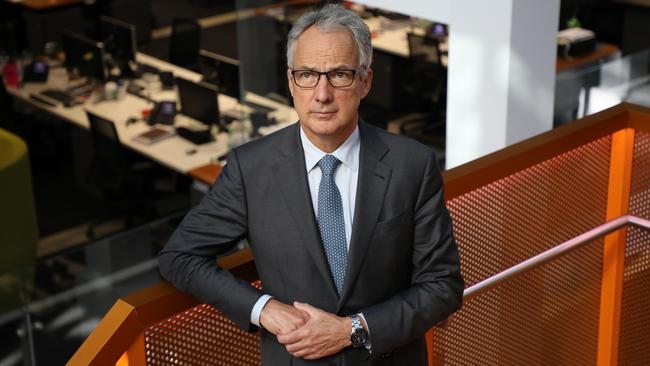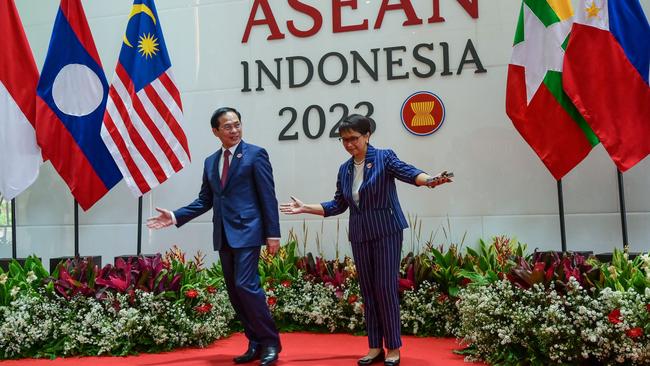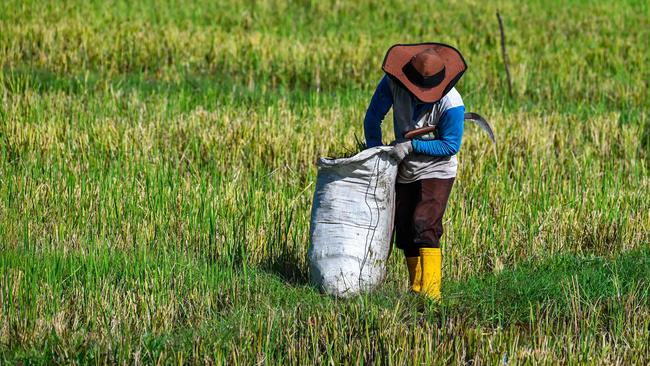How ex-Macquarie chief Nicholas Moore is resetting our ASEAN engagement
Fearing competitors could gain an edge in Australia’s back yard, the government has hired ex-Macquarie chief Nicholas Moore to identify how to increase trade and investment with Southeast Asia.

It was with a hint of exasperation that Indonesia’s Investment Minister, Luhut Pandjaitan, wrote this week of how he uses every trip abroad, including his recent visit to Australia, to remind people “that Indonesia today is not the Indonesia of decades ago”.
“We are in the midst of a major transformation,” he said. “Even though many countries still look down on us, more than a few appreciate the great changes we have made in Indonesia.”
Jakarta should be in no doubt that Canberra champions its ambitions to become one of the world’s largest economies thanks to the work of successive Australian governments.
But Indonesia’s complaint – that it is viewed through a historic lens and not as it is today – could apply to any of Australia’s 10 ASEAN neighbours (with the exception of Singapore) when it comes to perceptions within the business community, which largely prefers to do business with, rather than in, its closest markets.
Turning that ship around, while always desirable, has taken on greater urgency since the bilateral relationship with China hit the skids and the pandemic further underscored the need to diversify markets.

Fearing competitor markets are now stealing an edge in the nation’s back yard, the Albanese government has hired one of the country’s top chief executives to identify the most useful things it could do to increase Australia’s two-way trade and investment with Southeast Asia by 2040: a date by which the region could have up to 26 million households with disposable incomes of more than $35,000.
It’s a multibillion-dollar question – two-way trade with ASEAN is currently $127bn – that former Macquarie Group head Nicholas Moore is working his way across the neighbourhood to answer.
In Indonesia and Singapore this week for consultations with business groups, Moore, who surely has his own ideas from having led Macquarie’s investment forays in the region, was keeping his powder dry.
“It’s premature for me to get to the end of the story at the beginning, so we are open-minded in terms of suggestions,” he told The Weekend Australian in Jakarta. “And we are getting great suggestions.”
Moore says he is impressed with the depth of engagement he has seen so far, “though of course we are all ambitious in terms of how to increase that”.
“The scale of what’s happening and the scale of opportunity is very impressive and we know that will increase. What we want is for that increase to be greater than GDP on both sides.”
Developing economic relations with ASEAN nations – and Indonesia in particular as Australia’s most important neighbour – “is a forever project for both nations”, Moore says.
But right now his job is “looking at the people in the market who are engaged in investing and engaged in trade, and asking what more can be done. What can government do to assist?
“It has already been identified that investment is an area we could really step up our game. We are trying to talk to people about what their ambitions are and what’s actually stopping investment taking place.”
In an article for Singapore’s Business Times this week, Moore pitched Australia as a trusted supplier of quality products, services and expertise keen to deepen engagement, though he noted “what I’m hearing from partners is both sides can do more, especially in developing skills and investment”.

That at is particularly so in Indonesia, where one senior business figure complained this week that there was “almost no momentum” in the push for greater Australian vocational training.
“It’s not just Indonesia that needs employable skills, but also Japan, Korea, Taiwan, the Middle East who are all big importers of Southeast Asian labour. An Australian vocational certificate is the ‘killer app’ for unlocking this flow of skilled labour to the rest of the world,” he said.
Australia ASEAN Chamber of Commerce chief executive Deborah Biber agrees with Moore that there are “underappreciated assets in the region”, but says Australia is punching below its weight in economic engagement in a region of more than 800 million people, and cites a recent Zoom call hosted by the ASEAN Business Advisory Council with 77 participants.
“I listened for more than two hours to what the Americans are doing, what the Canadians are doing, the Japanese, and it was amazing,” Biber says.
“Those Australian businesses that are there are doing well but there’s not enough of them, and not enough investment. And as a country, if we invest in these countries then those local businesses will eventually invest in Australia as well. It’s a virtuous circle.”
Biber is one of many suggesting a more visible presence on the ground, perhaps in the form of one-stop shop business advisory offices or director institutes.
Moore says that will be considered, though points to Australia’s already “substantial presence”, including through its largest overseas mission in Jakarta.
Biber, who spent 34 years in Hong Kong, says one obstacle to deeper business engagement is a lack of Southeast Asia literacy on company boards, and estimates just 1 per cent or 2 per cent of Australian company directors have ASEAN experience.
“That’s something I think really needs to be addressed,” she says. “It’s about being Asia-literate as well as understanding the culture. I worked all over Asia and it’s about building relationships of trust first. It’s about asking Indonesians, Malaysians, Cambodians what they need and then working out what Australia can actually support them with.”
Asia literacy means many things: knowing how to enter the market, how to conduct negotiations, understanding the culture in that market – though Biber also worries Australia has dropped the ball on Asian language education.
“Australians feel so much more comfortable doing business in the US or UK and that’s not where our future is,” she says. “Our future is in our neighbourhood. It’s about understanding risk but you don’t understand that risk until you get into the market and start talking to people.”
Leigh Howard, who ran businesses in Singapore and Malaysia for 20 years and now runs the Melbourne University-affiliated AsiaLink, says Australia still has “some advantage because of our historic relations and the high regard a lot of Asian economies have for our goods and services, but that’s going to fade over time as other countries prioritise their engagement in the region”.
“It really does feel like other countries are seeing something in Southeast Asia that we just don’t see,” Howard says. “Are we going to wait 30 years for when Indonesia is one of the world’s top economies before we act?”

Part of the problem, he suggests, is business conditions at home were so good, at least pre-Covid and interest rate rises, that companies were not developing the critical skills required to set up and establish trade and investment opportunities in Asia.
He also believes Australian firms feel more familiar with Western markets, “but the centre of economic opportunity has shifted dramatically”, even if legacy perceptions of the ASEAN market have not.
Just as Kerry Packer’s ill-fated foray into India took on mythical proportions (after he took a $US225m bath on IT, software and media markets there in the early 2000s), Australians are more likely to invoke cautionary tales of epic failures than success stories.
Howard cites the higher education sector as one of those successes, for having spent time understanding the market, and now views it as riskier not to be present in Asia.
“The best thing government could do is provide the tools and resources to enter the market; things like knowledge of regulations, how to enter a market and how to do business there from cultural capabilities to operating on the ground,” he says, though concedes that is no simple task given the diversity of the 10 ASEAN markets.
“Austrade does a good job on the ground but I’m more interested in how we are preparing Australian businesses before they get there. Who is getting on the plane, what do they know and how will they represent Brand Australia when they get there?”
Asia Society’s Richard Maude says his group has passed on its own suggestions to Moore, “none of which are easy to put into practice”. Maude says: “Is there any more mileage to be squeezed out of the free trade agreement network (of which Australia is involved in 16 regional and bilateral deals)? The growing consumer class has to be a focus, including whether we’re plugging in enough to e-commerce, which is a growing market.
“There are also some sectors where we risk falling behind if we don’t reinvest, education being one. Are there new opportunities in emerging sectors like clean energy, and an interesting medium-term question is whether trade can grow beyond our traditional focus on services, mining and agriculture.”
Australian governments have been less hands-on in supporting investors overseas than some of the nation’s competitors, though it could be time to review that model, he adds.
“Should the government consider radical new approaches like helping put consortia together? Could it do more to help Australian investors navigate local systems, given the risks involved?”
Swathes of Southeast Asia still have an “overly protectionist, if not autarkic, mindset”, says Maude.
It can be hard to get into markets and once there it can be harder to manage corporate and sovereign risks within often deeply political systems with inadequate judicial systems.
“But it’s also true that Southeast Asia has changed a lot in the last 10 years. The market is bigger, there’s more opportunity and a sense of greater complementarity than in the past,” Maude says.
Moore points to the government-backed “hothouse” investment body Katalis – established under the 2020 Indonesia Australia Comprehensive Economic Partnership Agreement – as a good example of where the state is playing a greater role.
Ultimately, though, there’s only so much government can do to lure business – as Panjaitan alluded to this week after making his pitch to Australian lithium producers to join nickel-rich Indonesia in building the world’s biggest electric-vehicle battery industry.
“Australia is our best candidate and potential partner to develop the EV battery industry … but to do that we need to gain (their) confidence,” the Investment Minister wrote.




To join the conversation, please log in. Don't have an account? Register
Join the conversation, you are commenting as Logout